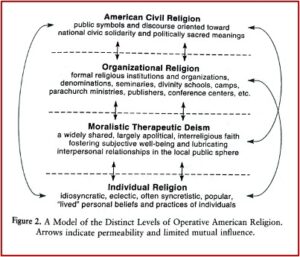
Until I listened to a five-and-a-half minute excerpt from the podcast Ask Christian Counseling Associates, “Moralistic Therapeutic Deism vs Traditional Christianity,” I had never heard of the term. I was surprised to know it has been around since 2005, when “moralistic therapeutic deism” was introduced by Christian Smith with Melinda Lundquist Denton in, “Soul Searching: The Religious and Spiritual Lives of American Teenagers.” It reminded me of the spiritual, not religious distinction made by Alcoholics Anonymous and the recovery-based support groups that use A.A.’s 12 Steps. Smith’s conclusion in “Soul Searching” was that “a significant part of Christianity in the United States is actually only tenuously Christian” and has “rather substantially morphed into” it’s misbegotten stepcousin, Christian Moralistic Therapeutic Deism. The similarities between being the “spiritual, not religious” sense of the 12 Steps and this misbegotten stepcousin of Christianity are worth unpacking.
“Soul Searching” was the result of the National Study of Youth and Religion (NSYR), a research project on the religious and spiritual lives of American adolescents. It was conducted from 2001 to 2005 at the University of North Carolina at Chapel Hill. The NSYR did a national, randomized telephone survey of U.S. households with at least one teenager. Then 17 trained project researchers organized 267 in-depth, face-to-face interviews with a subsample of these telephone survey respondents in 45 states.
Building upon the thought of Robert Bellah in his 1967 essay, for the journal Daedalus, “Civil Religion in America,” Smith and Denton theorized that Moralistic Therapeutic Deism operated on an analogous, but different level of religion to Bellah’s sense of American civil religion. See Figure 2, scanned from “Soul Searching” below.
 The bottom level is the eclectic, idiosyncratic, personal beliefs and practices of Individual Religion. Formal religious institutions and organizations of the more systematized and coherent faiths operate on the plane of Organizational Religion. At the peak is the nationally unifying political faith of American Civil Religion. Smith and Denton see Moralistic Therapeutic Deism (MTD) existing on a plane between Individual and Organizational Religion.
The bottom level is the eclectic, idiosyncratic, personal beliefs and practices of Individual Religion. Formal religious institutions and organizations of the more systematized and coherent faiths operate on the plane of Organizational Religion. At the peak is the nationally unifying political faith of American Civil Religion. Smith and Denton see Moralistic Therapeutic Deism (MTD) existing on a plane between Individual and Organizational Religion.
Like American civil religion, Moralistic Therapeutic Deism appropriates, abstracts, and revises doctrinal elements from mostly Christianity and Judaism for its own purpose. But it does so in a downward, apolitical direction. Its social function is not to unify and give purpose to the nation at the level of civic affairs. Rather, it functions to foster subjective well-being in its believers and to lubricate interpersonal relationships in the local public sphere. Moralistic Therapeutic Deism exists, with God’s aid, to help people succeed in life, to make them feel good, and to help them get along with others—who otherwise are different—in school, work, on the team, and in other routine areas of life.
Suggesting that religion in the U.S. operates on those levels includes interaction and influence on each other, according to Smith and Denton. Individual beliefs are shaped in part by the teachings of organized religions, as well as horoscopes, talk shows, etc. American civil religion is affected by both liberal religious activism as well as the Religious Right (or in more current terminology, Christian Nationalism), operating at the level of a formal religious organization. “The same observation about interlevel interaction and influence is also true of Moralistic Therapeutic Deism. It helps organize and harmonize individual religious beliefs below it.”
It also mirrors and may very well interface with American civil religion at the highest level by providing the nation’s inhabitants a parallel and complementary common, unifying, functional faith that operates at a more apolitical, private, and interpersonal level of human life.
Smith and Denton said the “creed” of moralistic therapeutic deism can be codified into five beliefs (pp. 162-63):
- A God exists who created and orders the world and watches over human life on earth.
- God wants people to be good, nice, and fair to each other, as taught in the bible and by most world religions.
- The central goal of life is to be happy and to feel good about oneself.
- God does not need to be particularly involved in one’s life except when God is needed to resolve a problem.
- Good people go to heaven when they die.
MTD is about instilling a moralistic approach to life. “Central to living a good and happy life is being a good, moral, person.” This includes being nice, kind, pleasant, respectful, responsible, working on self-improvement taking care on one’s health, and doing your best to be successful. MTD is about providing therapeutic benefits. It’s not a religion of repentance from sin, of saying your prayers, of keeping the Sabbath and holy days, “of living as a servant of a sovereign divine”, of building character through suffering.
It is about attaining subjective well-being, being able to resolve problems, and getting along amiably with other people. . . As long as one is happy, why bother with being able to talk about the belief content of one’s faith? Lastly, MTD is about a particular understanding about God. God exists, created the world and defines our general moral order, but is not one who is particularly personally involved in one’s affairs—especially affairs in which one would prefer not to have God involved. Most of the time, the God of this faith keeps a safe distance.
Anyone familiar with the teachings and beliefs of conservative, biblical, Christianity can see the problems with this so-called “creed.” It seems to equate biblical teaching and that of other religions, blurring an important distinction between special and common grace. It has a self-centered focus, ignoring that humanity’s “chief end” (according to the Westminster Shorter Catechism) is to glorify God, and enjoy him forever. He is not the Divine Butler and Cosmic Therapist.
This God is not demanding. He actually can’t be, because his job is to solve our problems and make people feel good. In short, God is something like a combination Divine Butler and Cosmic Therapist; he is always on call, takes care of any problems that arise, professionally helps his people feel better about themselves, and does not become too personally involved in the process.
Ultimately, it is Christless. The self-sacrifice of Christ in order to sanctify and cleanse us is not necessary. Saying he was the way, the truth and the life; that no one comes to the Father except through him (John 14:6) was a misstatement. In their Conclusion for chapter four, “God, Religion, Whatever,” Smith and Denton said:
We have come with some confidence to believe that a significant part of Christianity in the United States is actually only tenuously Christian in any sense that is seriously connected to the actual historical Christian tradition, but has rather substantially morphed into Christianity’s misbegotten stepcousin, Christian Moralistic Therapeutic Deism. This has happened in the minds and hearts on many individual believers and, it also appears, within the structures of at least some Christian organizations and institutions. The language, and therefore the experience, of Trinity, holiness, sin, grace, justification, sanctification, church, Eucharist, and heaven and hell appear, at the very least, to be supplanted by the language of happiness, niceness, and an earned heavenly reward. It is not so much that U.S. Christianity is being secularized. Rather more subtly, Christianity is either degenerating into a pathetic version of itself or, more significantly, Christianity is actively being colonized and displaced by a quite different religious faith.
A Google search of the term found over 35,000 references to “moralistic therapeutic deism.” There have been many different reflections on the implications of MTD. It is more than simply a problem in youth ministry. Writing for The Gospel Coalition, Brian Cosby said MTD runs counter to the gospel of Jesus Christ. God is not the divine genie, dispensing wishes, but Immanuel—he became human “to seek and save his bride.” By faith alone, through his life, death, and resurrection Jesus Christ has accomplished everything God has required of us. And only those who come through him will see the Father in heaven.
Albert Mohler said the radical transformation of Christian theology and Christian belief in MTD replaced the sovereignty of God with the sovereignty of self. Human problems are reduced to pathologies in need of a treatment plan. “Sin is simply excluded from the picture, and doctrines as central as the wrath and justice of God are discarded as out of step with the times and unhelpful to the project of self-actualization.”
We now face the challenge of evangelizing a nation that largely considers itself Christian, overwhelmingly believes in some deity, considers itself fervently religious, but has virtually no connection to historic Christianity. Christian Smith and his colleagues have performed an enormous service for the church of the Lord Jesus Christ in identifying Moralistic Therapeutic Deism as the dominant religion of this American age. Our responsibility is to prepare the church to respond to this new religion, understanding that it represents the greatest competitor to biblical Christianity.
I would disagree with Dr. Mohler that MTD is a new religion in the sense that it has existed with individuals saying they are spiritual, not religious which can be traced back to the thought of William James over 100 years ago. He distinguished institutional religion from personal religion in his seminal work, The Varieties of Religious Experience. See part 2 for how MTD emerged from the sense of spiritual, not religious belief.





